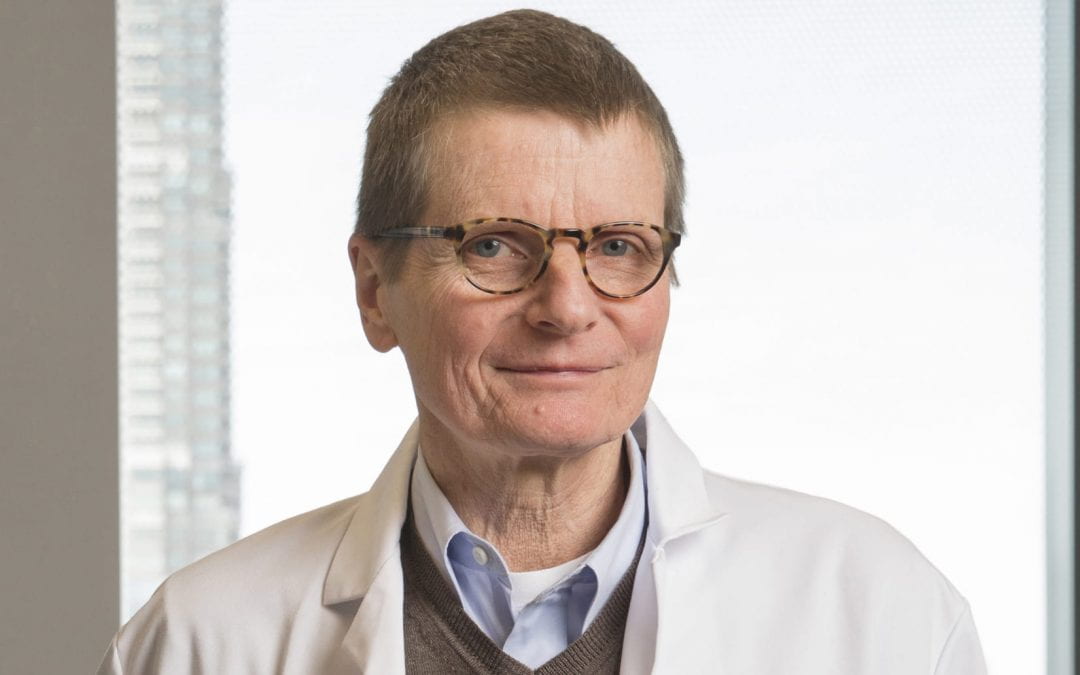Infectious diseases specialist and immunity researcher to serve as inaugural faculty director
Following a national search, renowned physician-scientist Eric G. Pamer has been recruited to be the inaugural faculty director of The Duchossois Family Institute at the University of Chicago Medicine starting July 1.
Formerly with Memorial Sloan Kettering Cancer Center, Pamer will lead the Duchossois Family Institute as it seeks to carry out groundbreaking research on how the human immune system, microbiome and genetics may interact to maintain health. He will work closely with faculty, students and staff across the University of Chicago and UChicago Medicine to develop directions for research at the institute, to recruit outstanding faculty and to establish an innovative infrastructure that promotes discovery and translation.
The news comes nearly two years after UChicago Medicine announced the largest gift in its history to establish the Duchossois Family Institute: Harnessing the Microbiome and Immunity for Human Health. The institute is dedicated to investigating and developing new knowledge about the human biological defense systems, including the microbiome, and their therapeutic and commercial potential for preventing disease and maintaining lifelong wellness. The $100 million gift, announced in May 2017, was from Craig Duchossois, chairman and CEO of Duchossois Group Inc. and a longtime University and Medical Center Trustee; his wife, Janet Duchossois; and The Duchossois Family Foundation.
“We are delighted by the recruitment of Dr. Pamer, as it speaks to UChicago’s continued record of attracting the best minds who can take on great challenges,” said Kenneth S. Polonsky, executive vice president for medical affairs at the University of Chicago. “Under his leadership, the Duchossois Family Institute will leverage the University’s and Medical Center’s strengths and resources in the fields of genomics, the human immune system, data analytics and the microbiome to develop novel approaches to enhancing the body’s natural ability to maintain health and prevent disease.”
Pamer is an infectious diseases expert who specializes in immune defense against infections associated with cancer treatment and an accomplished scientist whose research focuses on the microbiome’s impact on resistance to a wide range of microbial pathogens. He comes to Chicago from Memorial Sloan Kettering Cancer Center in New York City, where he has served as head of the Division of Subspecialty Medicine since 2011 and director of the Lucille Castori Center for Microbes, Inflammation and Cancer since 2010. He joined Memorial Sloan Kettering in 2000 as chief of infectious diseases and has served as professor of medicine at Weill Cornell Medicine since 2001. Prior to his tenure in New York, he worked at Yale University from 1992 to 2000 as an assistant and associate professor of infectious diseases and immunobiology.
“We are delighted by the recruitment of Dr. Pamer, as it speaks to UChicago’s continued record of attracting the best minds who can take on great challenges.”
“My laboratory has been studying how to optimize the body’s immune defenses against a range of infections,” Pamer said. “Recent technical and computational advances have enabled us to investigate the role that commensal bacteria living on our surfaces and in the intestine play in defense against infections and in the pathogenesis of inflammatory diseases. We need to exploit these fundamental biological discoveries to advance the emerging field of health optimization and to identify how these insights can be applied, both clinically and commercially. I look forward to collaborating with researchers and clinician-scientists to tackle those challenges.”
Board certified in internal medicine and infectious diseases, Pamer is a member of the National Institute of Allergy and Infectious Diseases’ Board of Scientific Counselors and of the Bill and Melinda Gates Foundation’s Global Health Scientific Advisory Committee. He has published more than 200 articles and book chapters. He received his medical degree from Case Western Reserve University and completed his residency and clinical fellowship at the University of California, San Diego.
—Story was originally posted on the University of Chicago Medicine website.


